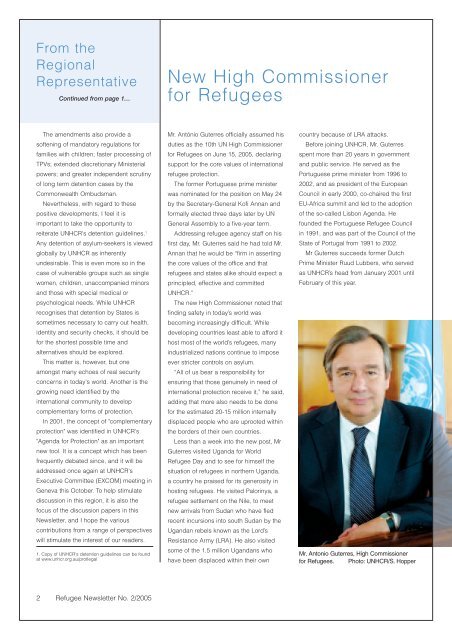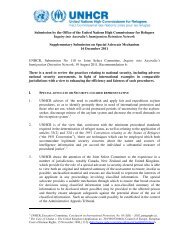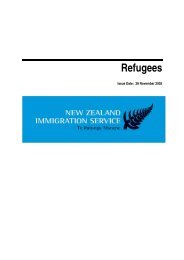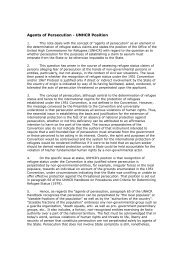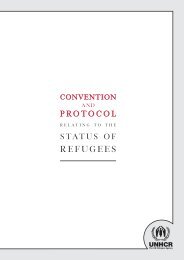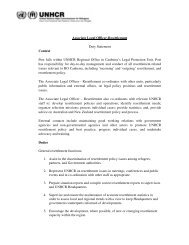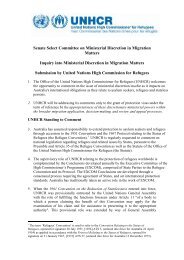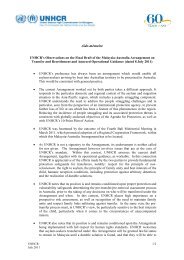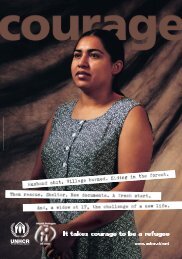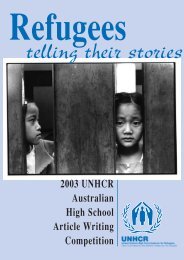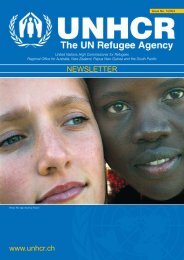Refugee Newsletter - unhcr
Refugee Newsletter - unhcr
Refugee Newsletter - unhcr
You also want an ePaper? Increase the reach of your titles
YUMPU automatically turns print PDFs into web optimized ePapers that Google loves.
From theRegionalRepresentativeContinued from page 1…New High Commissionerfor <strong>Refugee</strong>sThe amendments also provide asoftening of mandatory regulations forfamilies with children; faster processing ofTPVs; extended discretionary Ministerialpowers; and greater independent scrutinyof long term detention cases by theCommonwealth Ombudsman.Nevertheless, with regard to thesepositive developments, I feel it isimportant to take the opportunity toreiterate UNHCR's detention guidelines. 1Any detention of asylum-seekers is viewedglobally by UNHCR as inherentlyundesirable. This is even more so in thecase of vulnerable groups such as singlewomen, children, unaccompanied minorsand those with special medical orpsychological needs. While UNHCRrecognises that detention by States issometimes necessary to carry out health,identity and security checks, it should befor the shortest possible time andalternatives should be explored.This matter is, however, but oneamongst many echoes of real securityconcerns in today's world. Another is thegrowing need identified by theinternational community to developcomplementary forms of protection.In 2001, the concept of "complementaryprotection" was identified in UNHCR's"Agenda for Protection" as an importantnew tool. It is a concept which has beenfrequently debated since, and it will beaddressed once again at UNHCR'sExecutive Committee (EXCOM) meeting inGeneva this October. To help stimulatediscussion in this region, it is also thefocus of the discussion papers in this<strong>Newsletter</strong>, and I hope the variouscontributions from a range of perspectiveswill stimulate the interest of our readers.1. Copy of UNHCR's detention guidelines can be foundat www.<strong>unhcr</strong>.org.au/protlegalMr. António Guterres officially assumed hisduties as the 10th UN High Commissionerfor <strong>Refugee</strong>s on June 15, 2005, declaringsupport for the core values of internationalrefugee protection.The former Portuguese prime ministerwas nominated for the position on May 24by the Secretary-General Kofi Annan andformally elected three days later by UNGeneral Assembly to a five-year term.Addressing refugee agency staff on hisfirst day, Mr. Guterres said he had told Mr.Annan that he would be “firm in assertingthe core values of the office and thatrefugees and states alike should expect aprincipled, effective and committedUNHCR.”The new High Commissioner noted thatfinding safety in today’s world wasbecoming increasingly difficult. Whiledeveloping countries least able to afford ithost most of the world’s refugees, manyindustrialized nations continue to imposeever stricter controls on asylum.“All of us bear a responsibility forensuring that those genuinely in need ofinternational protection receive it,” he said,adding that more also needs to be donefor the estimated 20-15 million internallydisplaced people who are uprooted withinthe borders of their own countries.Less than a week into the new post, MrGuterres visited Uganda for World<strong>Refugee</strong> Day and to see for himself thesituation of refugees in northern Uganda,a country he praised for its generosity inhosting refugees. He visited Palorinya, arefugee settlement on the Nile, to meetnew arrivals from Sudan who have fledrecent incursions into south Sudan by theUgandan rebels known as the Lord’sResistance Army (LRA). He also visitedsome of the 1.5 million Ugandans whohave been displaced within their owncountry because of LRA attacks.Before joining UNHCR, Mr. Guterresspent more than 20 years in governmentand public service. He served as thePortuguese prime minister from 1996 to2002, and as president of the EuropeanCouncil in early 2000, co-chaired the firstEU-Africa summit and led to the adoptionof the so-called Lisbon Agenda. Hefounded the Portuguese <strong>Refugee</strong> Councilin 1991, and was part of the Council of theState of Portugal from 1991 to 2002.Mr Guterres succeeds former DutchPrime Minister Ruud Lubbers, who servedas UNHCR’s head from January 2001 untilFebruary of this year.Mr. Antonio Guterres, High Commissionerfor <strong>Refugee</strong>s. Photo: UNHCR/S. Hopper2 <strong>Refugee</strong> <strong>Newsletter</strong> No. 2/2005


